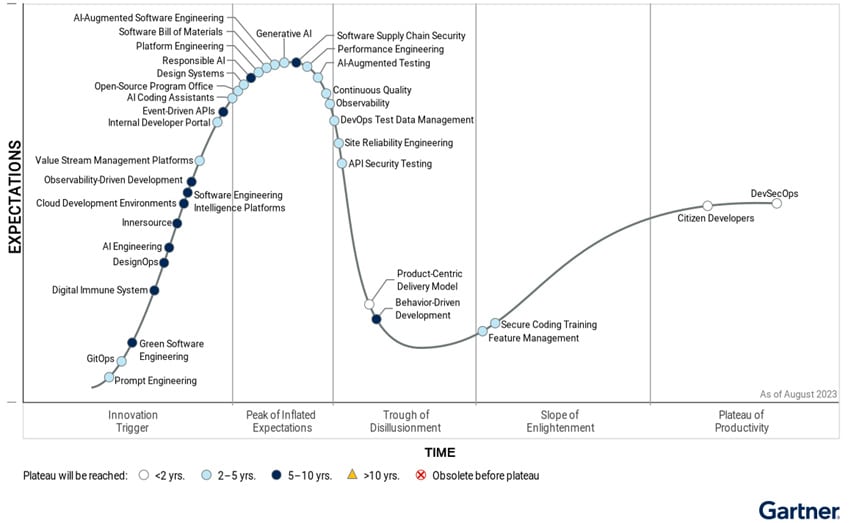Transformational technologies, including AI-augmented software engineering (AIASE), AI coding assistants and platform engineering, will reach mainstream adoption in 2-5 years – so predicts Gartner.
“AI-augmented and machine learning (ML)-powered software engineering is changing the way software is being created, tested and operated, and the need for responsible AI is growing,” said Dave Micko, senior director analyst at Gartner. “Practices such as platform engineering will begin injecting insights from deployed systems into the systems being developed.”
These technologies, along with others, are climbing the peak of inflated expectations and the transformational benefit they are expected to have on software engineering in the next few years could have a significant impact on an organisation’s business models, driving new strategies and tactics (see Figure 1).
Figure 1: Hype Cycle for software engineering, 2023

AI coding assistants
Gartner predicts that by 2027, 50% of enterprise software engineers will use ML-powered coding tools, up from fewer than 5% today. Code generation products based on foundation models can generate complex and longer suggestions resulting in a significant increase in developer productivity.
Because software demand exceeds most organisations’ capacity, existing developers are maxed out, unable to build features fast enough or find satisfaction in their work. AI coding assistants are emerging as accelerators, boosting developer productivity and happiness. By handling routine tasks, the assistants enable developers to focus on higher-value activities. This allows organisations to deliver more features faster with existing teams.
AI-augmented software engineering
The software development life cycle includes routine and repetitive tasks such as boilerplate functional and unit-test code and docstrings, which AIASE tools automate. This allows software engineers to focus their time, energy and creativity on high-value activities like feature development.
Along with more productive, engaged and happier software builders. the benefits of using AIASE include the allocation of software engineering capacity to business initiatives with high priority, complexity and uncertainty, helping quality teams develop self-healing tests and nonobvious code paths which detect issues, offer fixes and automatically generate test scenarios.
Platform engineering
To help manage the complexity of the technology ecosystem, many digital enterprises are embracing platform engineering practices and establishing platform teams to provide consistent, integrated and secure platforms to their development and product teams. Platform engineering focuses on providing self-service tools, capabilities and processes that help platform users deliver business value while managing cost and risk.
Gartner predicts that by 2026, 80% of software engineering organisations will establish platform teams as internal providers of reusable services, components and tools for application delivery.



